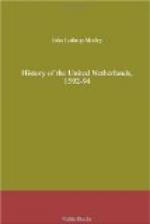Thus, while the duke was making great military preparations far invading France without means; pawning his own property to get bread for his starving veterans, and hanging those veterans whom starving had made. mutinous, he was depicted, to the most suspicious and unforgiving mortal that ever wore a crown, as a traitor and a rebel, and this while he was renouncing his own judicious and well-considered policy in obedience to the wild schemes of his master.
“I must make bold to remind your Majesty,” again whispered the spy, “that there never was an Italian prince who failed to pursue his own ends, and that there are few in the world that are not wishing to become greater than they are. This man here could strike a greater blow than all the rest of them put together. Remember that there is not a villain anywhere that does not desire the death of your Majesty. Believe me, and send to cut off my head if it shall be found that I am speaking from passion, or from other motive than pure zeal for your royal service.”
The reader will remember into what a paroxysm of rage Alexander was thrown on, a former occasion, when secretly invited to listen to propositions by which the sovereignty over the Netherlands was to be secured to himself, and how near he was to inflicting mortal punishment with his own hand on the man who had ventured to broach that treasonable matter.
Such projects and propositions were ever floating, as it were, in the atmosphere, and it was impossible for the most just men to escape suspicion in the mind of a king who fed upon suspicion as his daily bread. Yet nothing could be fouler or falser than the calumny which described Alexander as unfaithful to Philip. Had he served his God as he served his master perhaps his record before the highest tribunal would have been a clearer one.
And in the same vein in which he wrote to the monarch in person did the crafty Moreo write to the principal secretary of state, Idiaquez, whose mind, as well as his master’s, it was useful to poison, and who was in daily communication with Philip.
“Let us make sure of Flanders,” said he, “otherwise we shall all of us be well cheated. I will tell you something of that which I have already told his Majesty, only not all, referring you to Tassis, who, as a personal witness to many things, will have it in his power to undeceive his Majesty, I have seen very clearly that the duke is disgusted with his Majesty, and one day he told me that he cared not if the whole world went to destruction, only not Flanders.”
“Another day he told me that there was a report abroad that his Majesty was sending to arrest him, by means of the Duke of Pastrana, and looking at me he said: ’See here, seignior commander, no threats, as if it were in the power of mortal man to arrest me, much less of such fellows as these.’”
“But this is but a small part of what I could say,” continued the detective knight-commander, “for I don’t like to trust these ciphers. But be certain that nobody in Flanders wishes well to these estates or to the Catholic cause, and the associates of the Duke of Parma go about saying that it does not suit the Italian potentates to have his Majesty as great a monarch as he is trying to be.”




